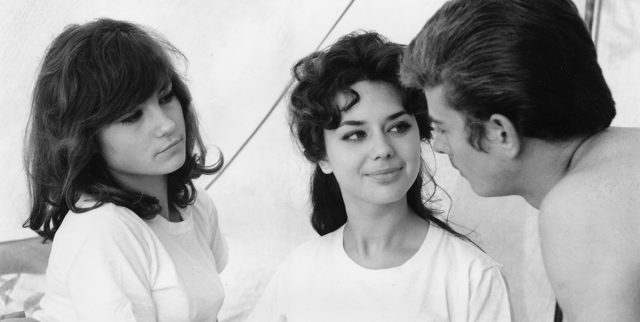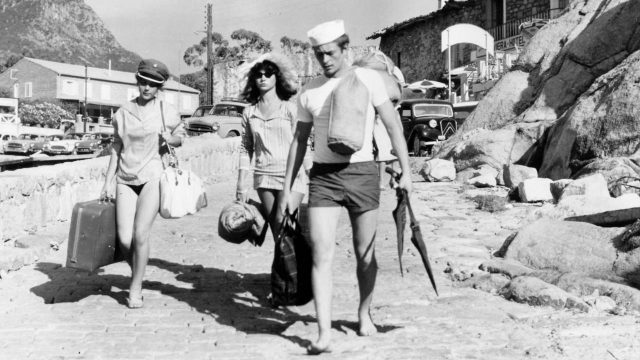
Liliane (Yveline Céry), Juliette (Stefania Sabatini), and Michel (Jean-Claude Aimini) have some wild adventures in ADIEU PHILIPPINE
CINÉSALON: ADIEU PHILIPPINE (Jacques Rozier, 1962)
French Institute Alliance Française, Florence Gould Hall
55 East 59th St. between Madison & Park Aves.
Tuesday, October 25, $14, 4:00 & 7:30
212-355-6100
www.fiaf.org
 FIAF’s two-month CinéSalon series “Beyond the Ingénue” comes to a close October 25 with one of the lesser-known French New Wave classics, Jacques Rozier’s shamefully seldom screened Adieu Philippine. Rozier’s first film is a freewheeling adventure as Michel (Jean-Claude Aimini), a young man working in a television studio, cavorts with a pair of eighteen-year-old best friends, Juliette (Stefania Sabatini) and Liliane (Yveline Céry), while waiting to be called up to serve in the Algerian War. Rozier opens the film by taking viewers into the studio, where they are shooting a lively jazz performance by French violinist Maxim Saury and his band, the bouncy rhythm meeting the behind-the-scenes chaos. Pretending to be more important than he really is, Michel invites Juliette and Liliane to come in, and soon the trio is hitting cafés and nightclubs, camping on the beach, and trying to hook up with would-be filmmaker Pachala (Vittorio Caprioli). But what started out as fun gets somewhat more serious as jealousy creeps in and the war intervenes.
FIAF’s two-month CinéSalon series “Beyond the Ingénue” comes to a close October 25 with one of the lesser-known French New Wave classics, Jacques Rozier’s shamefully seldom screened Adieu Philippine. Rozier’s first film is a freewheeling adventure as Michel (Jean-Claude Aimini), a young man working in a television studio, cavorts with a pair of eighteen-year-old best friends, Juliette (Stefania Sabatini) and Liliane (Yveline Céry), while waiting to be called up to serve in the Algerian War. Rozier opens the film by taking viewers into the studio, where they are shooting a lively jazz performance by French violinist Maxim Saury and his band, the bouncy rhythm meeting the behind-the-scenes chaos. Pretending to be more important than he really is, Michel invites Juliette and Liliane to come in, and soon the trio is hitting cafés and nightclubs, camping on the beach, and trying to hook up with would-be filmmaker Pachala (Vittorio Caprioli). But what started out as fun gets somewhat more serious as jealousy creeps in and the war intervenes.

A trio of young French dreamers fight ennui and prepare for war in Jacques Rozier’s seldom-screened ADIEU PHILIPPINE
Adieu Philippine is an exhilarating tale of teenage freedom, of youth taking advantage of all life has to offer no matter one’s circumstance, fighting off ennui with a mad desire to just have fun. Rozier, who wrote the screenplay with Michèle O’Glor, allowed the cast of mostly nonprofessional actors to improvise and dubbed in dialogue later, resulting in less-than-stellar syncing that took two years in postproduction but thankfully gets lost in all the wild abandon. In his debut feature, cinematographer René Mathelin (Pardon Mon Affaire, The Tall Blond Man with One Black Shoe) shoots guerrilla-style in black-and-white, a kind of cinéma vérité in which passersby and people in the background often look at the camera, wondering what is going on. Adieu Philippine shares a soul and spirit with the early work of such auteurs as Jean-Luc Godard (1960’s Breathless), a friend and supporter of Rozier’s; American-born French photographer and documentarian William Klein (1958’s Who Are You, Polly Maggoo?), and François Truffaut, whose similarly themed Jules et Jim was also released in 1962, but Adieu Philippine has a charm all its own. Rozier, who turns ninety on November 10, would make only a handful of other features, including 1985’s Maine-Ocean and 2001’s Martingale. A new 35mm print of Adieu Philippine is being shown at FIAF on October 25 at 4:00 and 7:30; the later screening will be introduced by New York Review of Books editor Madeleine Schwartz.